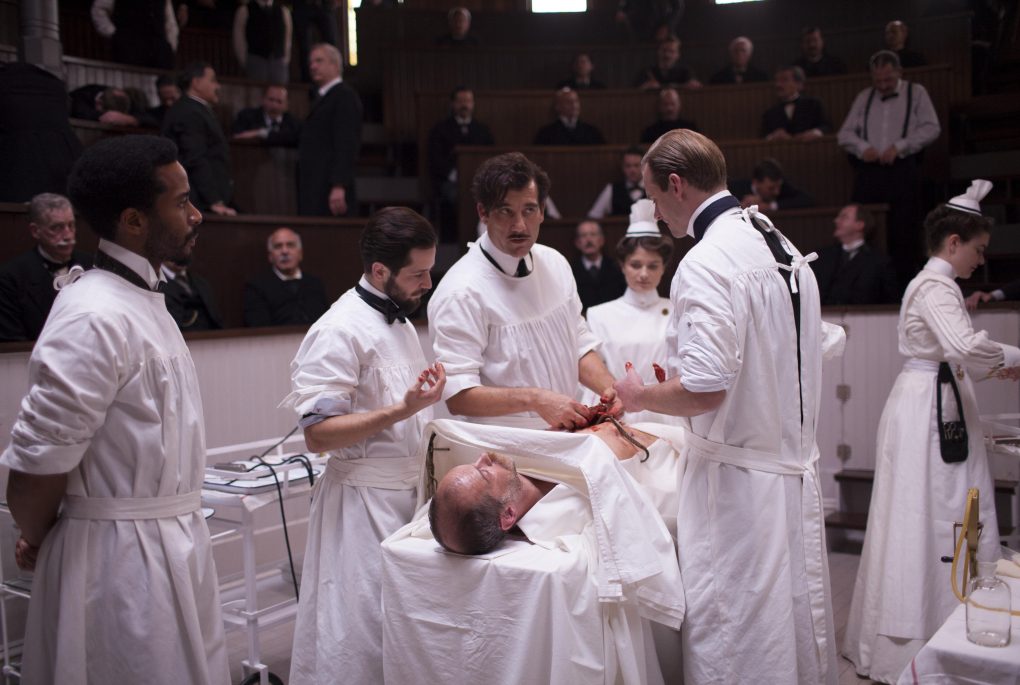The Knick – Behind the Scenes with Cliff Martinez
In Ghettoblaster 39 (on stands now), we had a chance to interview Jack Amiel and Michael Begler, executive producers and creators of director Steven Soderbergh’s new Cinemax series, The Knick. Included below is a GhettoblasterMagazine.com exclusive interview from series composer, Cliff Martinez (who’s name you may also know from his work with Captain Beefheart and Red Hot Chili Peppers).
By: Amy Yates Wuelfing
In 1900, a disheveled man stumbles out of an opium den early in the morning. Bleary-eyed, he tells the driver of a horse-drawn carriage to take the long way. During the ride he shoots cocaine between his toes and straightens up his appearance, and as he regains his composure the electronic music in the background sharpens and becomes quicker and more focused, matching the horse’s gallop. He arrives at his destination looking sharp as a tack, exits the carriage and strides into a hospital building. While the music doesn’t fit the time period, it complements the scene perfectly.
Cliff Martinez, veteran punk rock drummer and now composer, is the man behind The Knick’s music. So why add contemporary music to a series set in 1900?
Cliff explains, “[Director] Steven Soderbergh didn’t want the music to reference the time period at all. The music of that time would have been Ragtime, and I’m glad I wasn’t asked to do that, as I would have fallen on my face. For The Knick, he said to keep it modern and electronic, but other than that he let me do what I wanted, which is probably why most of my favorite scores are the ones I have done for Steven’s projects.”
Are there ever disagreements with the director over music?
“Oh yeah. As a matter of fact there are usually one or two per show. For The Knick he said no strings allowed, which I didn’t quite understand. There was some good music that ended up on the cutting room floor, just because it had strings.”
Martinez’s relationship with Steven Soderbergh began when they met through mutual friends and collaborated on the director’s first film, 1989’s Sex, Lies, and Videotape. Since that project Martinez has worked on the majority of Soderbergh’s projects. Does he ever feel typecast as “Soderbergh’s composer?”
“I like to think I maintain a level of distinction outside of this semi-monogamous relationship. The good thing about working with the same director is that they often do something different each time, and so as a composer I am asked to do something different each time. With Steven it goes from Magic Mike to Liberace to a period medical drama. The only other director I have worked with more than once is Nicolas Winding Refn, and when he asked me to do Only God Forgives the only rule was, ‘Thou shalt not sound like Drive.’”
Cliff Martinez began his musical career drumming for Captain Beefheart, Lydia Lunch and The Weirdos, until late 1983 when he joined the Red Hot Chili Peppers, replacing Jack Irons.
“After I left the Chili Peppers in 1986, I played with the Dickies for a while before I threw in the towel altogether. I still play drums on soundtracks occasionally, but that’s it. I don’t miss it. I don’t like being on stage, playing the same stuff night after night. When I was in the Chili Peppers, we weren’t big the rock stars they are now, so we traveled a lot. Plus, I started in the Chili Peppers kind of late; I was 29 years old. If I was 21, I might have given it ten years of my life, but I kept thinking, ‘Do I want to be 40 years old walking out on stage with a sock on my genitals? How is that going to work?’”
When the Red Hot Chili Peppers were inducted into the Rock and Roll Hall of Fame in April of 2012, Cliff once again found himself behind the drums.
“That was scary; I haven’t played regularly since 1991. Flea called me up just a few weeks before the Rock and Roll Hall of Fame induction ceremony and asked that I play a song with them. I said yes, but my drums had been in the closet for 25 years. They wanted to play “Give It Away,” which shouldn’t be difficult, but I spent two hours a day, every day, for weeks, on just that song to get it right.”
After leaving the Chili Peppers, in 1987, he was asked to score “Why Wasn’t I Invited?”,an episode of Pee-wee’s Playhouse.
“They sent me a rough cut of the episode, so it didn’t have music or sound effects, and I thought it was the worst episode of Pee-wee’s Playhouse ever. But then as I began to compose the music I got a big head, like, ‘I just saved this episode.’ What I was actually experiencing was the power of scoring and what a difference the music makes. It was then I got really excited about the whole idea of composing for film.
“One of the first films I saw that made me seriously think about composing was The Grifters in 1990. I loved the music, and I assumed it was Danny Elfman who was the composer, but it was Elmer Bernstein, who was 80 years old. I thought maybe this is one area of music where age, experience and wisdom is valued, and that appealed to me, because I want to keep making music until I drop dead.”
Clint Mansell, formerly of Pop Will Eat Itself, has forged a whole new career by composing for Darren Aronofsky, Wayne Kramer from MC5 did the music for HBO’s Eastbound & Down, not to mention Mark Mothersbaugh and Danny Elfman before them. So what inspires old punks to go into composing?
“The complete destruction of the music industry! It’s either get into scoring or stand by the side of the highway with a sign that says, ‘Will play for food.’ That, and old age. I outgrew the music, to a degree. I still enjoy rock and roll, but I stopped going to clubs and started going to movie theaters. Scoring is one of the few remaining things you can do in music where you can get a steady paycheck.”
So has he ever been committed to a project only to find out he just doesn’t like it?
“I get a pretty good sense beforehand if it’s something I’ll like or not, and I’ve passed on a few things for just that reason. I know I’m going to have to look at it day in and day out, and if it doesn’t provide inspiration, then the music will suffer. The one film that got to me—and I didn’t think it would—was Wonderland, about the Wonderland murders. At the time I was living down the street from where the murders occurred. I’ve done a lot of violent films with shooting and stabbing, but because it happened so close to where I was, and the murders were reenacted to make entertainment out of it, it kind of gave me the creeps. I had an unsettled feeling watching that footage day after day, but watching Ryan Gosling crush somebody’s head in an elevator over and over again? No problem.”
Issue 37 Outtakes: The Knick's Cliff Martinez








Social Media